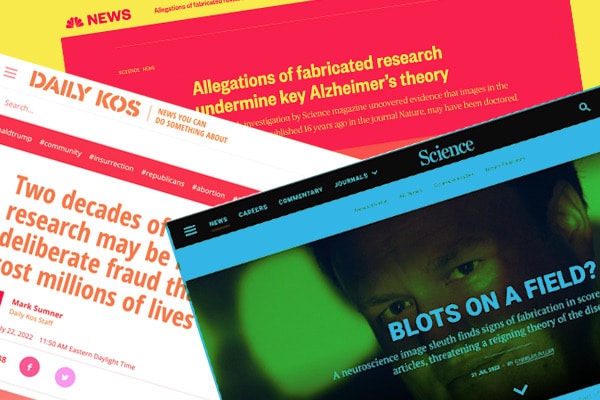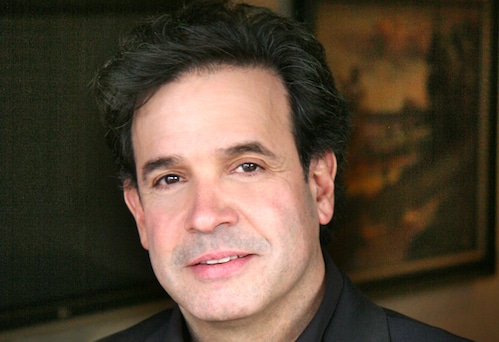Bombshell exposé in Science magazine and follow-up reporting “make a mountain out of a molehill,” leading Alzheimer’s experts say.
The media is reporting that recent fraud allegations undermine the leading theory about the cause of Alzheimer’s. But some of the field’s most established experts —along with a senior author on the very study in question — say the significance of the potentially doctored data is being wildly overstated.
Alzheimer’s research and drug development is often more dramatic and polarizing than reality shows like Love Island or Jersey Shore. In some of the past year’s hottest dramas, Aduhelm’s manufacturer Biogen and the FDA were found to have had back-channel meetings leading up to the drug’s surprise approval, (which went against the FDA’s advisory committee’s recommendations). In February 2024, Biogen took Aduhelm off the market indefinitely. Cassava Sciences is facing allegations of fraud surrounding their drug simufilam. And now, worrying stories report that the evidence supporting the beta-amyloid hypothesis of Alzheimer’s may be fraudulent.
According to bombshell new allegations, prominent University of Minnesota Alzheimer’s researcher Sylvain Lesné may have manipulated or fabricated important experimental data in a widely-cited study published in Nature in 2006.
These allegations spring from a six-month investigation conducted by journalists at Science, tipped off by a “neuroscientist sleuth,” into a series of studies on Alzheimer’s key biomarker beta-amyloid. In all, dozens of figures and images in scientific studies were flagged as suspicious by experts. In Science’s recent exposé, “Blots on a Field,” one expert called them “shockingly blatant” examples of image tampering.
What’s the damage?
The Science report, followed by DailyKos and NBC News articles, leaned into the catastrophic damage this finding could have on the entire amyloid hypothesis, with experts — including Nobel laureate and Alzheimer’s expert Thomas Südhof at Stanford University — chiming in on how Lesné’s bad data may have fueled “wasted NIH funding” and “wasted thinking in the field.”
But leading experts are positing a different take: that findings of Lesné’s 2006 study, in fact, have not had a noteworthy impact on pursuit of the amyloid hypothesis — and thus, any errors or fraud in the data have not steered the course of research at all.
These experts call the media coverage hyperbole. Among them is a senior author on the 2006 study itself, Karen Ashe, at the University of Minnesota.
Ashe voiced her disappointment of being potentially misled by her colleague Lesné, but more, she said, it is a misreading of the 2006 study altogether to say that it is central to the amyloid hypothesis, as decades of research preceding it supported beta-amyloid as a potential therapeutic target.
READ ON: Alzheimer’s Biomarkers
101: What Is Beta-Amyloid?
“Regarding Charles Piller’s article in Science, I cannot comment on the allegations about images that may have been inappropriately altered by my former co-worker Dr. Sylvain Lesné, because he is now under formal investigation at the University of Minnesota,” she wrote in a post on Alzforum. “However, I will comment on his scientific statements, because his description of my scientific thesis is inaccurate.
“Having worked for decades to understand the cause of Alzheimer disease, so that better treatments can be found for patients, it is devastating to discover that a co-worker may have misled me and the scientific community through the doctoring of images. It is, however, additionally distressing to find that a major scientific journal has flagrantly misrepresented the implications of my work.”
Karl Herrup, a professor of neurobiology at the University of Pittsburgh, is a vehement critic of the amyloid hypothesis. While he would like to see the entire field move its funding and thinking away from beta-amyloid and toward other potential drug targets for Alzheimer’s treatment, he too believes that findings around any errors or fraud in data posited by the 2006 study — doctored or not — are inconsequential to the bigger thesis.
“The many iterations and variants of the amyloid cascade hypothesis do not depend on the Lesné findings and Aß*56,” he wrote on Twitter. “I agree that NIH funding has been wasted by chasing the amyloid cascade, but the blame for that is not the result of the actions of a single charlatan.”
Does the beta-amyloid theory still stand?
Many researchers believe that beta-amyloid proteins are responsible for the cognitive decline and neurodegeneration associated with Alzheimer’s disease. Imagine one of these proteins is a paperclip. These “paperclip” proteins form chains, called oligomers. Oligomers come in different shapes and sizes, and when they’re large enough, they can become tangled up together in insoluble clumps called “plaques.” Plaques muck up the works of the brain, and are associated with the cognitive decline seen in Alzheimer’s.
The highly-cited 2006 study, on which Lesné was first author and Ashe was senior author, found one particular type of beta-amyloid — Aꞵ*56 — caused cognitive decline in an animal study. It was one of the first pieces of evidence which seemingly confirmed the link between beta-amyloid and cognitive decline.
However, even at the time, researchers had trouble replicating these results — unable to find the elusive Aꞵ*56.
Meanwhile, beta-amyloid research continued, as it had for decades before the Aꞵ*56 study, and today, anti-amyloid therapeutics in current clinical trials like lecanemab target many different types of beta-amyloid oligomers. None were designed specifically against Aß*56. Diagnostic tests also don’t look for this specific oligomer. Rather, they test for beta-amyloid types Aß42 and Aß40.
In public responses to the recent revelation by Science, as well as in interview with Being Patient, a number of experts — including Rudolph Tanzi, Alzheimer’s expert and professor at Harvard Medical School — are pointing out that, while potential misconduct is an important issue, this finding around Aꞵ*56 has not been a significant influence to the overall course of Alzheimer’s research and drug development.
In fact, Tanzi told Being Patient, he suspects the 2006 paper was only cited so frequently because it was published in a big-name journal.
“The results in that particular paper were largely inconsequential to the majority of subsequent studies in the field,” Tanzi said. “[They] have had minimal, if any, impact on subsequent efforts aimed at targeting amyloid deposition for the purposes of early detection and early prevention of Alzheimer’s disease.”
He added that while the 2006 paper was often referenced following publication, it hasn’t been a significant focus of his research nor that of any of his colleagues that he knows of.
Prominent Alzheimer’s researcher Dennis Selkoe at Brigham and Women’s conducted and published studies in scientific journals that did not find Aꞵ*56 in human brain tissue in 2008. “This is a very sad example of human fragility and malfeasance, but the original finding about Aß*56 in Alzheimer’s was felt by many of us (including me) as unlikely to be meaningful or correct,” Selkoe told Being Patient via email. “This unfortunate incident does not alter the overwhelming genetic, neuropathological, animal modeling and even human clinical trial evidence that lowering amyloid of all forms, including [beta-amyloid] oligomers, can modify the disease, and lead to less clinical progression.”
Amyloid hypothesis still on trial
Despite decades of research into beta-amyloid, there are still no disease-modifying treatments that have led to improvements in cognition in human clinical trials.
While some experts commenting on the Science story and follow-up reports still believed pursuing this avenue of research is worthwhile, many others raised questions and concerns for the field — unrelated to the drama around Aß*56.
“I do think oligomers are very relevant in [Alzheimer’s] by causing—directly or indirectly—tau pathology which, in turn, alters neuronal function and survival,” Jochen Herms, professor at the Munich Center for Neurosciences wrote on Alzforum. “This is difficult to study in mice, since in humans it does take decades.”
Other researchers like Grace Stutzmann, a professor at Rosalind Franklin University, emphasized that there still isn’t strong clinical evidence supporting the amyloid hypothesis.
“At best, I see the field agreeing that Aβ [beta-amyloid] species, whether soluble oligomers or plaques, are a feature of the disease, largely because it is in the definition of an AD [Alzheimer’s disease] diagnosis—making it a somewhat circular argument,” she wrote. “ But we see increasing evidence that Aβ is not necessarily the center of the AD mechanism universe, including the long list of Phase 3 Aβ immunotherapy clinical trials that failed to alter the slope of cognitive decline.”
Increasingly, other theories for a root cause of Alzheimer’s, including viruses, are gaining traction — though funding and pharmaceutical research is still concentrated in amyloid studies.
READ ON: Fringe Theory? The Link Between
Viruses and Alzheimer’s Gains Traction
Meanwhile, the results of two key clinical trials of anti-amyloid agents are expected later this year or early 2023 — Biogen/Eisai’s lecanemab and Eli Lilly’s donanemab.
Over email, Herrup told Being Patient he was “struck by the unnecessarily strong tone” of the article and speculated on its timing, coming just before he suspects these drug studies will fail to show — as aducanumab’s data failed to show — that targeting beta-amyloid doesn’t improve cognition, anyway.
“I have been told that this fall should see the report on two new anti-amyloid clinical trials, and the juxtaposition seemed to fit,” Herrup said. “A mountain was being made out of a molehill,” he said of the Science article’s claims that Lesné’s data could have had any impact on the Alzheimer’s field. “[A] distraction was needed for what, by all accounts, will be another set of lackluster, if not negative, findings.”
UPDATE: 3 March 2024, 9:27 P.M. ET. In February 2024, Biogen took Aduhelm off the market, citing financial concerns. Although the drug did receive accelerated, conditional FDA approval for the treatment of early Alzheimer’s disease in 2021, it is no longer available to new patients. The company announced it would sunset trials in May 2024 and cease supplying the drug to current patients in November 2024.




